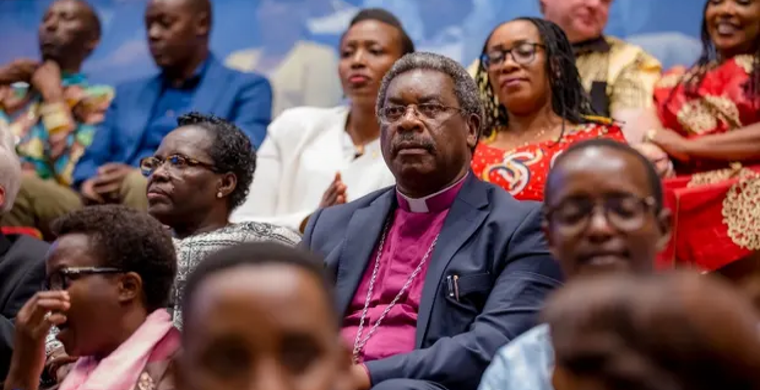Church of England welcomes back Rwandan bishop accused of defending genocide
Church of England reinstates Jonathan Ruhumuliza, who left former post after Observer report on his part in 1994 atrocities
Bishop Jonathan Ruhumuliza at the 17th National Umushyikirano Council in Kigali, Rwanda, in December 2019. Photograph: Tom Ndahiro
Chris McGreal and Harriet Sherwood
https://www.theguardian.com/world/
31 May 2020
The Church of England has reinstated a Rwandan bishop who left his role as a parish priest in Worcestershire after he was accused of complicity in the 1994 genocide of hundreds of thousands of Tutsis.
The Right Rev Jonathan Ruhumuliza, 64, left his position in the village of Hampton Lovett six years ago after the Observer reported that he was accused by human rights groups of acting as a public apologist for the genocidal government, and of being complicit in the atrocities. Ruhumuliza's former archbishop in Rwanda called him an "errand boy" for the Hutu extremist regime.
Following the revelations, the Church of England said Ruhumuliza had been placed on "special leave" by mutual consent. Last month, he was appointed to a new post at a church in the diocese of Manchester after the Home Office failed in its attempt to refuse the priest refugee status. The UK government had said in 2011 there were "serious reasons for considering that he had committed ... a crime against humanity".
Ruhumuliza has denied the more serious accusations against him but previously apologised for not speaking out against the genocide. The C of E has defended his appointment, citing rulings by the immigration tribunal and court of appeal confirming his right to stay in the UK, and "clear support" for him from his current archbishop in Rwanda.
Ruhumuliza, a Hutu, arrived in Britain in 2004, several years after leaving Rwanda where he faced severe criticism within the Anglican church over his part in promoting the extremist government at the height of the genocide.
In May 1994, Ruhumuliza wrote to the All Africa Council of Churches defending the genocidal government as "peace loving" and said it was trying to stop the slaughter at a time when it was overseeing massacres. Human Rights Watch said Ruhumuliza and the Anglican archbishop in Rwanda, Augustin Nshamihigo, "acted as spokesmen for the genocidal government" of prime minister Jean Kambanda, who subsequently pleaded guilty to genocide before an international tribunal.
In 1998, London-based African Rights claimed Ruhumuliza "arranged for Tutsis to be excluded from refuge" and alleged the priest was "directly involved in the killings" by making requests for weapons. After the genocide, he was made bishop of Kigali.
Ruhumuliza has previously denied accusations of complicity in the atrocities, endangering Tutsis and any involvement with distributing or requesting weapons.
But in 1996, he apologised for failing to "energetically condemn either the tragedy which was in progress or the state communiques which were broadcast on the radios during this time".
He said he should have "publicly condemn[ed] the genocide".
However, he continued to face criticism within the Anglican church in Rwanda from those who said his apology failed to address his defence of the government. In 1997, he moved to Canada and was later appointed bishop of Cameroon.
A year after Ruhumuliza arrived in Britain, he was appointed honorary assistant bishop in the diocese of Worcester and a priest at St Mary and All Saints church in Hampton Lovett, Worcestershire.
The Church of England said it had conducted extensive checks and found no evidence of complicity in genocide. It said the bishop had been commended to the C of E by the then archbishop of Rwanda, Emmanuel Kolini.
However, Kolini told the Observer that he had warned the Church of England that the church in Rwanda had not investigated the bishop's conduct, and said he had no knowledge of the "extensive checks" by Lambeth Palace.
In 2011, the Home Office refused Ruhumuliza political asylum, claiming he was implicated in crimes against humanity and was a "genocide-denier".
Three years later, Theresa May, then home secretary, again rejected Ruhumuliza's asylum application. That decision was overturned by an immigration tribunal on the grounds that, even if he was implicated in crimes against humanity, the priest had found redemption through his religious work since the genocide.
The appeal court upheld the tribunal decision in 2018. In a dissenting opinion, Lord Justice Singh said that the tribunal should have considered evidence as to whether Ruhumuliza was responsible for crimes against humanity and not solely decided whether he was entitled to asylum on the basis of his repentance.
Last month, Ruhumuliza was appointed interim minister at Astley, Tyldesley and Mosley Common, Manchester. He could not be reached for comment.
In a statement, the diocese of Manchester said: "The usual processes of checks and references were carried out by the diocese in making the appointment of Jonathan Ruhumuliza ... No issues were raised with us during this transfer process."
A spokesperson for the C of E said: "The immigration tribunal and, subsequently, the court of appeal found in 2018 that Jonathan Ruhumuliza had the right to remain in the UK... Following the conclusion of this legal process, the C of E ascertained that clear support was shown for Bishop Jonathan from his [present] archbishop in Rwanda. As a bishop in good standing with his home church, and subject to the normal checks applied to all bishops, he was allowed to seek a position within the C of E again."
END














